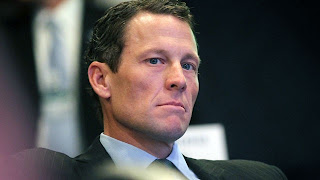The Lance Armstrong Case: Pride & Prejudice
 The latest developments in the Lance Armstrong case demonstrate, once again, the perennial battle between the rights of the individual athlete and those of the sport. Although the argument has been fully analysed already elsewhere in this blog, the question remains as to whether self-regulation has now exceeded its boundaries and limitations at the expense of another sporting icon: Lance Armstrong.
The latest developments in the Lance Armstrong case demonstrate, once again, the perennial battle between the rights of the individual athlete and those of the sport. Although the argument has been fully analysed already elsewhere in this blog, the question remains as to whether self-regulation has now exceeded its boundaries and limitations at the expense of another sporting icon: Lance Armstrong.
It is not our purpose to examine here the jurisdictional and contractual implications of USADA's decision to strip Lance Armstrong of his titles and possibly [in the near future] his medals. Such analysis may form the basis of a possible action before the Court of Arbitration for Sport. It is our intention, however, to inform our readers of the politics behind the scenes and the reasons as to why Lance Armstrong decided not to contest the allegations.
 |
| K. Kenteris: 200m Sydney Olympic gold |
We are in a position to appreciate why Lance Armstrong has little faith in self-regulation and loathes the lack of independence and transparency in the decision making process. The undersigned faced exactly the same situation when he acted as counsel for the two Greek sprinters, Kenteris and Thanou, before the Court of Arbitration for Sport, in the period of 2004-2006. Although the sprinters successfully negotiated an out-of-court settlement with the IAAF and therefore, avoided possible bans, return of medals and prize money, it can be argued that both of them, were emotionally and financially exhausted after the conclusion of this matter. Kenteris refused to continue with any further legal battles and Thanou continued to face the wrath of the IOC, who after failing to secure the allegations before CAS, it decided not to allow her to participate in the Beijing Olympics in 2008 and not to award her with the gold medal returned by Marion Jones. Although both Kenteris and Thanou were later also cleared by the Greek criminal court, they both decided to put an end to any further legal battles and focus on their families.
 |
| K. Thanou: 100m Sydney Olympic Silver |
Similarly, Lance Armstrong is well justified to say that he no longer wishes to continue with this unnecessary and unfair attempt by USADA to demonstrate to the world that it cares about the sport. We are convinced that it is not Lance Armstrong who brought the sport into disrepute, but USADA itself. Having the financial muscle and the backing of its parent body WADA, it rules and decides in an autocratic manner, similar to the one the undersigned experienced with the IOC, in the Greek Sprinters case. Lance Armstrong is well justified to put an end to this ordeal and concentrate on his family and his health.
 |
| Lance Armstrong |
The decision by Lance Armstrong not to contest the allegations comes as no surprise to the undersigned. Similarly, our readers must keep an open mind and consider very seriously the example, above, with the two Greek sprinters. Lance Armstrong has already won this battle in the eyes of the world. His silence does not indicate guilt, but a loud protest against the corrupt system that rules sport. USADA's decision to introduce allegations that relate to alleged incidents that may have occurred 14 years ago, not only violates several procedural rights afforded to Lance Armstrong, but it offends against fairness and justice in sport. Lance Armstrong is well justified to ignore such allegations, who are the product of an ill-founded desire to exercise and exert power over an athlete, who served the sport without evidence of malpractice and continues to serve humanity, by assisting tremendously in a noble and sacred cause.
We shall observe privacy and confidentiality, until the final conclusion of this matter. But we promise to offer our readers with a further insight into the politics and dirty dealings behind the scenes. Those who are prosecutors and judges simultaneously, must accept that self-regulation does not always enjoy immunisation from judicial intervention. Good justice derives from good evidence and such evidence is yet to be produced and evaluated. The reliability of the testimonies produced in court, could only be valid if the proximity, relevance and probity of their evidence, comes from a witness who does not have a conflict of interest in the case. If I were to produce a testimony in court, that sporting governing bodies selectively prosecute athletes, would the court in question find my testimony reliable? Think about it....
Dr. Gregory Ioannidis
25 August 2012



Comments
Post a Comment